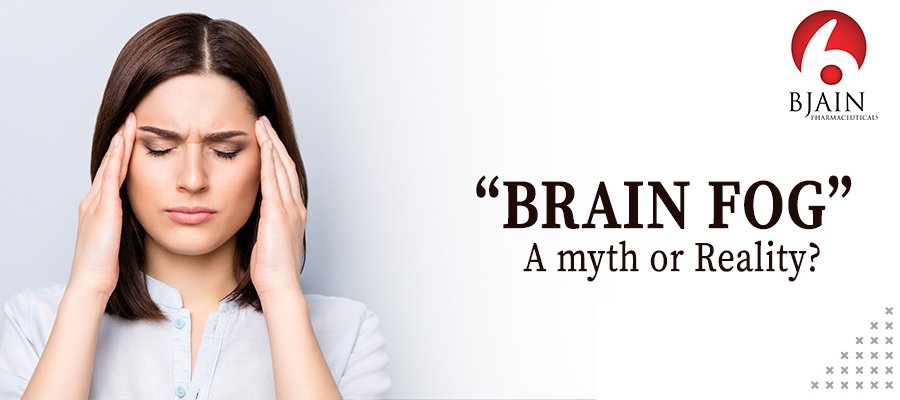Brain fog is a cognitive disorder marked by weakness in memory, trouble concentrating, disorientation, and brain tiredness. People with brain fog frequently express their mental processes as slow or “fuzzy,” and they have difficulty forming clear ideas or putting such ideas into speech. As a result, prolonged brain fog can hinder academic and career achievement while interfering with other daily life elements.
Brain fog is not a definitive diagnosis nor an officially recognized ailment; rather, it might be an indication of another, such as depressive disorders, fibromyalgia, or COVID-19. Certain drugs, chemotherapy, and pregnancy can all cause brain fog. It might also be attributed to issues with lifestyle, especially inadequate sleep or increased pressure; most individuals can identify with feeling cognitively “fuzzy” following a sleepless night or amid a busy period at work. Assessing the source of cognitive fog is frequently an initial step toward controlling it, whether through medications or, more commonly, lifestyle adjustments.
WORLD BRAIN DAY 2024
World Brain Day, also known as International Brain Day, is a worldwide medical event held on July 22nd annually for over a decade to raise concerns about brain illnesses. Today, numerous local and global societies and organizations convene to raise awareness and advocate for improved medical care, educational opportunities, and scientific study into neurological diseases.
To mark World Brain Day 2024, we want to focus on something that is not particularly life-altering but affects the quality and standard of life. Before discussing our day’s topic, let’s discuss the importance of observing World Brain Day.
Why is World Brain Day important?
As stated in the latest research paper in India, the proportion of non-communicable and injury-related neurological conditions in India’s overall illness rate has nearly quadrupled during the previous thirty years (1990-2019), perhaps reflecting a rise in the elderly population.
Stroke (37.9%), headaches (including migraine and tension- headaches), and seizures (11.3%) are the primary contributors to India’s brain-related burden.
Even though neurological conditions are one of the costliest illnesses in the world and are the biggest causes of fatalities and disabilities, the budget for safeguarding, treatment, education, and scientific study is far lower than for various other illnesses. As a result, promoting consciousness about brain disorders and acknowledging them as a high-priority field of preventing diseases is critical.
What may cause Brain Fog?
Several reasons might contribute to brain fog. To successfully treat brain fog, it is critical to first identify the potential causes.
- Stress.
Chronic stress might impair your capacity for rational thinking. Chronic stress can affect clarity, logic, and attention.
- Poor Sleep Quality
Inadequate sleep can negatively impact brain function. Insufficient or interrupted sleep can impair attention, memory, and clarity of thought.
- Hormonal Changes.
Hormonal fluctuations, such as those seen during pregnancy or menopause, can produce brain fog. Hormonal imbalance may affect cognitive functions and memory abilities.
- Nutrition
Whatever you consume has a significant impact on the well-being of your mind. Anemia can result from a lack of nutrients in diet such as iron and vitamin B12. That, consequently, decreases your stamina and may impair your cognitive abilities.
- Medications
Some medications may induce brain fog as an adverse effect. This includes remedies for anxiety, sadness, and cancer treatment.
- Medical conditions.
Many diseases can trigger brain fog, both directly and indirectly. These conditions range from hypothyroidism, chronic fatigue syndrome, fibromyalgia, multiple sclerosis (MS), and celiac disease. Handling an underlying issue is critical to overcoming brain fog.
What is the impact of Brain Fog on your health?
Every individual’s experience of brain fog could vary slightly. You might be experiencing certain symptoms with brain fog:
- Trouble focusing.
- Disorientation.
- Tiredness.
- Forgetfulness.
- Losing your stream of thinking.
- Mental fatigue.
- Lacking the appropriate words.
- Slow mental processing and response time.
- Having issues concentrating.
How can you manage Brain Fog?
A healthcare expert may initially suggest strategies to enhance your immunity, such as:
- Optimizing your sleeping patterns for an improved night’s rest.
- Consuming wholesome, nourishing meals.
- Doing light exercise for a half hour every day.
- Note critical details so you don’t lose it.
- Take brief pauses (approximately a half hour each) during the day to avoid overtaxing your brain.
- Engaging in counseling, such as cognitive behavioral therapy.
How can Homoeopathic medicine help with Brain Fog?
Homeopathic medications can greatly aid those suffering from brain fog. These medications aim to treat the underlying problem to promote a healthy and efficient cure. Homeopathic remedies for curing brain fog come from nature and have no adverse impacts. They are appropriate for persons of any age range.
- Brainology Syrup: Omeo Brainology Syrup is BJain Pharmaceutical’s specialty product for the complete wellness of your brain. It helps improve tiredness, lethargy, and the ability to concentrate without the haziness of thoughts. It also improves the general mood and prostration of your mind.
- Kali phos: One of the best medications for mental confusion is Kali Phos. Whenever you have forgetfulness or problems with memory, it works well. It works best if brain fog results from overworking, overthinking, overstudying, or worrying. With this, the intellect becomes monotonous and sluggish. There may occasionally be signs of melancholy, depression, and a lot of sobbing. Anxiety can also exist at times. It is among the finest medications for treating mental stress and its associated symptoms. Another well-known treatment for chronic fatigue syndrome (CFS) is Kali phos.
- Phosphoric acid: This medication is helpful for those who have trouble gathering their thoughts. When they speak, they struggle to find the appropriate word. When they read, their ideas disappear. They read it but were unable to understand it. They fail to remember things after learning. They can also not think clearly and have lost all of their thoughts. They become lightheaded when thinking. They also lack inventiveness and suffer from sluggish intellect and poor recall.
- Gelsemium: This is a frequently used remedy for those with trouble concentrating and thinking effectively. Those who require it struggle to focus or comprehend clearly. As a result, their mental dullness is evident. Along with mental tiredness comes mental disarray. They are incapable of doing any thought-intensive tasks. Any mental effort causes them to experience fading ideas.
- Picric acid: Its application is also recommended for those who work too much on literature and have brain fog. The indications include a lack of capacity to gather ideas and a rapid sense of tiredness from utilizing the intellect, reading or writing for extended periods, or engaging in little intellectual tasks.
Conclusion:
Brain Fog might not seem like a dire disorder of the brain but it notably hampers everyday functions. This World Brain Day 2024, we should pledge not to ignore our health, whether physical or mental. Brain should not be taken for granted and its health should be our priority. Holistic health requires complete fitness and to achieve that we have to go the extra mile.

Dr Kiran Swami
Dr. Kiran Swami, BHMS, MD (Hom.), a Research Officer at BJain Pharmaceuticals Pvt. Ltd., holds degrees from Nehru Homeopathic Medical College, Delhi, and Dr. Sarvepalli Radhakrishnan Rajasthan Ayurved University, Jodhpur. With expertise in homeopathy and a passion for research, she drives innovation in holistic healthcare solutions.


